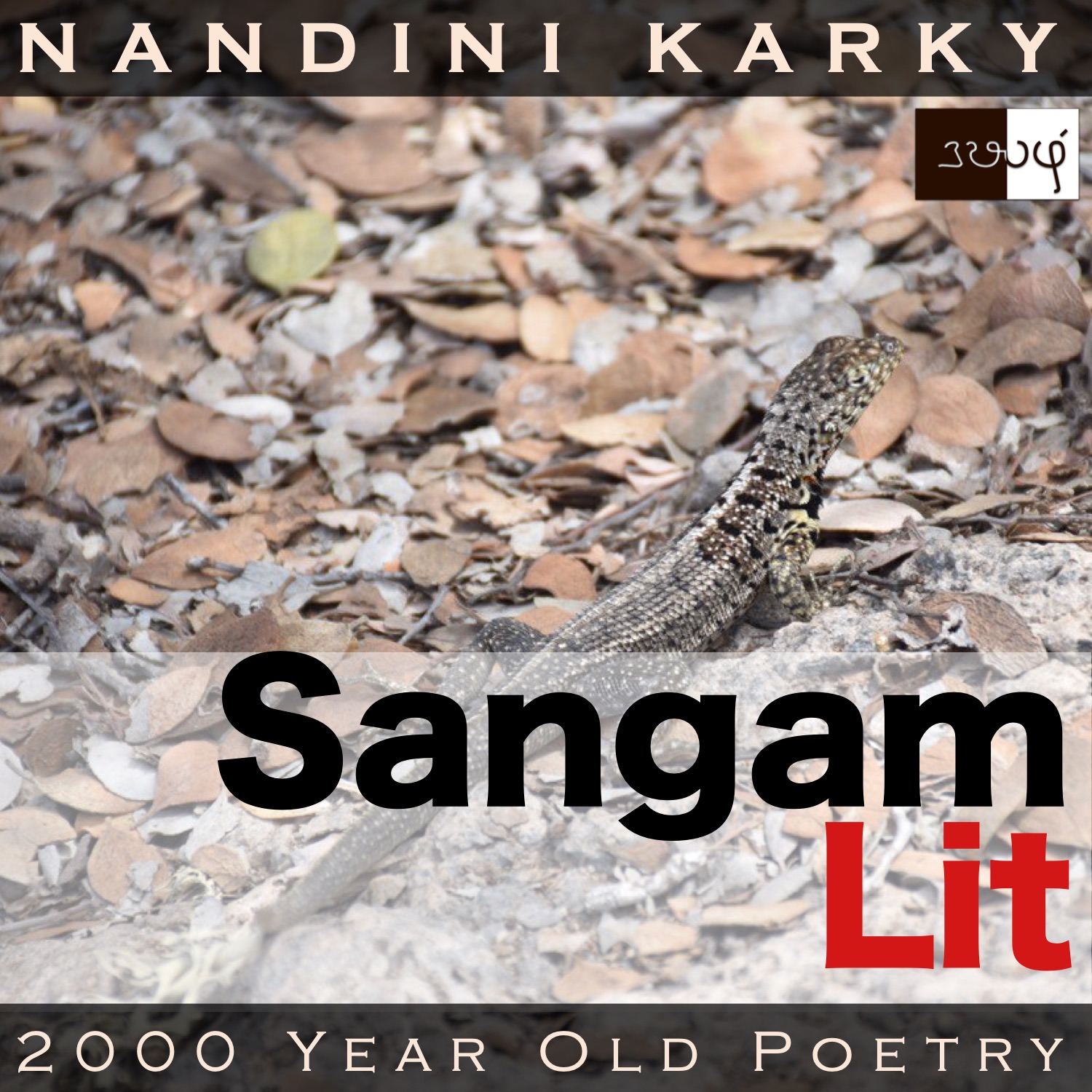Podcast: Play in new window | Download
Subscribe: Apple Podcasts | Spotify | Amazon Music | Android | iHeartRadio | Email | TuneIn | RSS | More

In this episode, we perceive scenes from nature throwing light on an attitude of acceptance, as depicted in Sangam Literary work, Natrinai 186, penned by an anonymous poet. Set in the drylands region of ‘Paalai’, the verse speaks in the confident voice of the lady, relieving fears in the confidante’s mind about the consequences of the man’s departure.
கல் ஊற்று ஈண்டல கயன் அற, வாங்கி,
இரும் பிணர்த் தடக் கை நீட்டி, நீர் நொண்டு,
பெருங் கை யானை பிடி எதிர் ஓடும்
கானம் வெம்பிய வறம் கூர் கடத்திடை,
வேனில் ஓதி நிறம் பெயர் முது போத்து,
பாண் யாழ் கடைய, வாங்கி, பாங்கர்
நெடு நிலை யாஅம் ஏறும் தொழில-
பிறர்க்கு என முயலும் பேர் அருள் நெஞ்சமொடு
காமர் பொருட் பிணி போகிய
நாம் வெங் காதலர் சென்ற ஆறே.
Opening with the phrase ‘கல் ஊற்று ஈண்டல’, the verse brings before our eyes, a place where there’s scarce water that needs to be ‘scraped up from amidst the stones’. We understand that it’s an elephant doing the scraping when we meet ‘பெருங் கை யானை’, ‘the long-handed elephant’. Another animal looks up at us in ‘வேனில் ஓதி’ meaning ‘a drylands chameleon’ and specifically, ‘முது போத்து’, ‘an aged male’. Having had our fill of the fauna, we turn our attention to the flora mentioned, ‘யாஅம்’ , the ‘ya’ tree commonly called as ‘anjan’. The verse ends with ‘வெங் காதலர் சென்ற ஆறே’ talking about ‘the drylands path to which the desirable lover left’. Let’s take a trek through this path to make meaning out of these glimpses.
The man and lady were in a happy, married relationship when the man decides to leave in search of wealth. He conveys his decision to the lady’s confidante and hearing this, she starts to worry about the effect the man’s departure is going to have on the lady. Seeing differences in the confidante, the lady probes her and discovers the reason. To the confidante, the lady then says, “Scraping the base of a waterhole filled by a spring and drawing water by extending its dark, rough and long trunk, the male elephant rushes towards its female in that parched path in the scorched forest. There, a colour-changing old male chameleon suffers in the heat. When travelling musicians play on their lutes nearby, the chameleon takes it in, and climbs on the ‘ya’ tree in that drylands path. This is where the lord, my love, has journeyed to, with a desire to gather wealth so that he can grant unto others. Such is his generous heart!” With these words, the lady expresses the strength in her mind and alleviates the confidante’s anxiety.
Now, time to unravel this poem filled with nuance! The lady depicts two different scenes from nature to show her mind’s fortitude. In the first scene, we find an elephant near a waterhole, making ripples in it by moving its trunk back and forth and then, with all its might, it takes in the water to the last drop and rushes towards its female. In the second scene, we see an old chameleon tired out and lying on the ground, unable to move in the scorching heat. Just then, there’s music in the air. Some travelling bards play on their lutes to forget the tiredness of their journey. Hearing this music, the chameleon seems enthused and starts climbing up the tall ‘ya’ tree. The lady says that such is the path to which the man has departed. But there’s much more hidden here by the art of hiding one’s heart in metaphors that Sangam folks are well-versed with. The first scene involving the male elephant rushing to quench the thirst of its female is a metaphor for how the lady sees the man’s journey to gather wealth as his way of bestowing a comfortable life for her. Before we head into the second scene, let’s hear from the lady about the core motive for the man’s parting in search of wealth. She clarifies to us, that he has this desire to seek wealth not to hoard and enrich himself but because he can give to those who seek from him. With this, she talks about the man’s compassionate heart and says that it’s for a noble reason that he has decided to part away from her.
The meaning of the second scene involving the chameleon and musicians becomes clear. Just like how the chameleon draws strength from the music of the bards, the lady too would draw strength from the man’s noble purpose. In most poems, we see the confidante consoling the lady when the man parts away from her. But, in this poem, the roles are reversed and the lady consoles the confidante saying that there’s no need to worry about how she would bear with her man’s parting away. A poem that feels like a breath of fresh air, with its positive message of bearing with momentary angst, by turning the focus to the far-reaching boon that’s hidden within!




Share your thoughts...